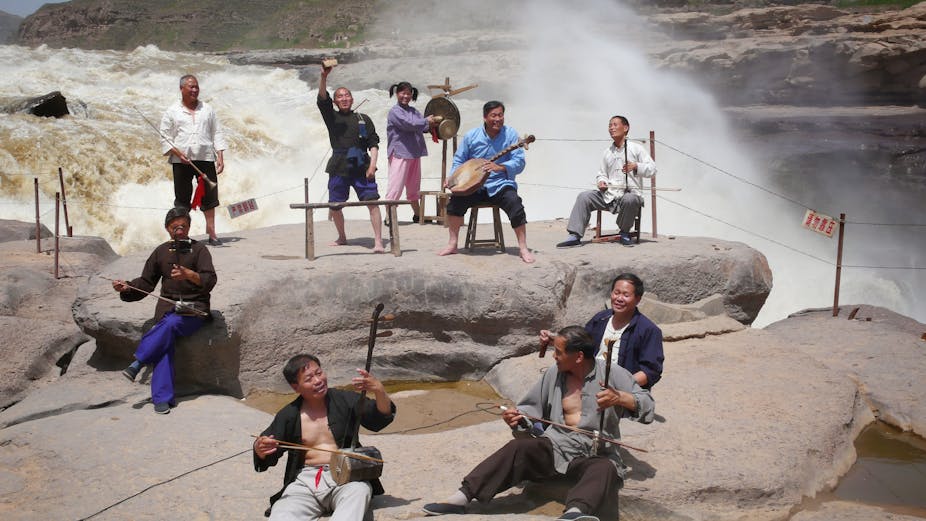We’ve all heard — or heard of — Mongolian throat singing and Peking Opera. But a new Chinese musical tradition is beginning to reverberate around the world – and will be showcased this week at the Sydney Festival.
New in a manner of speaking. Lao Qiang means “old tune,” and it originated some 2,000 years ago in the town of Hua Yin, a fishing and farming village near the Yellow River in Shaanxi Province.
To this day, Hua Yin remains a focal point of Lao Qiang performance for weddings, birthdays, and other communal festivities. Celebrating the epic legends of the Three Kingdoms, the mystical creation of Hua Mountain, and the misadventures of local farmers, this is one of the oldest surviving folkloric traditions in the world.
But what does it mean for an ancient tradition to “survive”?
And how can such an old tradition maintain some semblance of authenticity while on display in premier auditoriums around China, France, Germany, the US (Carnegie Hall no less) – and now the Sydney Festival?
These were the questions on my mind when I called New York to speak with ethnomusicologist Joanna Lee, who was instrumental in bringing the show to Sydney.
“Lao Qiang is no longer sung to keep time while pulling ropes to haul boats onto the shore,” she told me, “but it is still very much alive as community practice in and around Hua Yin.” Its longevity earned Lao Qiang a place in China’s coveted register of Intangible Cultural Heritage in 2006.

To maintain Lao Qiang’s faithfulness to traditional meaning, Lee has given its Sydney performance a dimension absent from previous enactments. She has painstakingly translated and programmed the words of each song into an LED display that scrolls across the stage, enabling the audience to follow its ancient stories and lessons.
Translation was no simple task, she says, because the phrases are rich with double entendre and hidden meaning. People are represented as cows and sheep, pagan gods are cloaked in nature metaphors, and, “when men and women ‘become one,’ well, I thought it best to just to leave the text in its simple beauty.”
Before learning about Lao Qiang, I had come across other world traditions scaled-up from community practice to stage extravaganza.
A year in Senegal showed me how musicians born into the griot caste no longer sing the praises of community leaders and nobles. Instead they pay homage to the politicians, soft-drink brands and cigarette companies that sponsor them.
In Cuba, spiritual traditions such as Regla de Ocha and Palo Monte were once the sacred preserve of enslaved Africans. Now they are a prime source of content for cabaret shows performed in expensive beachside hotels.
Around the world, commercial “folklorisation” has generated dollars for performers and their employers, in the process drawing practitioners away from the traditions of their ancestors. One wonders how Lao Qiang, described by reviewers as “the rock ‘n’ roll of the East,” compares.
Audiences can expect a family-friendly show whose purpose, says Lee, is to respectfully integrate ancient tradition with the demands of 21st-century entertainment.

Songs have been redacted to concise two or three minute versions, showcasing the most passionate and moving storylines of the ancient repertoire. Shadow puppets of the fabled Three Heroes offer a visual treat that has been captivating crowds for millennia. Homemade huqin fiddles and yueqin lutes combine with traditional drums, gongs, and a wooden bench in a unique folkloric ensemble.
And the members of the Zhang Family Band, now seasoned international entertainers, enact the ancient battle legends they grew up with on the wheat and cotton fields.
Lao Qiang evokes a lesson I learned as an anthropology graduate student: traditions never stay still.
Those with long lives become progressively codified as “ethnic heritage,” often conserved by cultural centres and performance troupes. The Centre for the Preservation of Lao Qiang, recently established by the Hua Qin government, illustrates the point.
Supported by the Zhang Family Band’s success, the Centre researches Lao Qiang history, documents its defining features, and keeps performances accountable to ancient roots. This synergy of local and global forces will show itself on stage, strengthened by the hidden meanings that Lee has worked into the translation.
Some of the verses may go over our heads, but that’s the beauty of cultural conservation in the global era.
Lao Qiang is playing at the Sydney Festival until January 25. Details here.
Visit the University of Sydney’s festival hub here.

